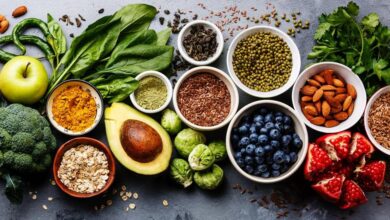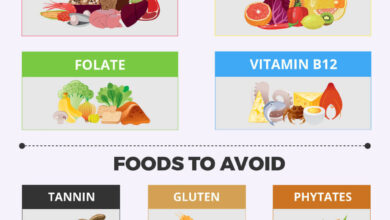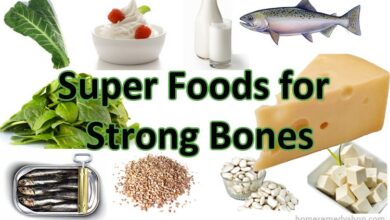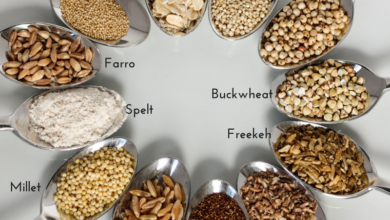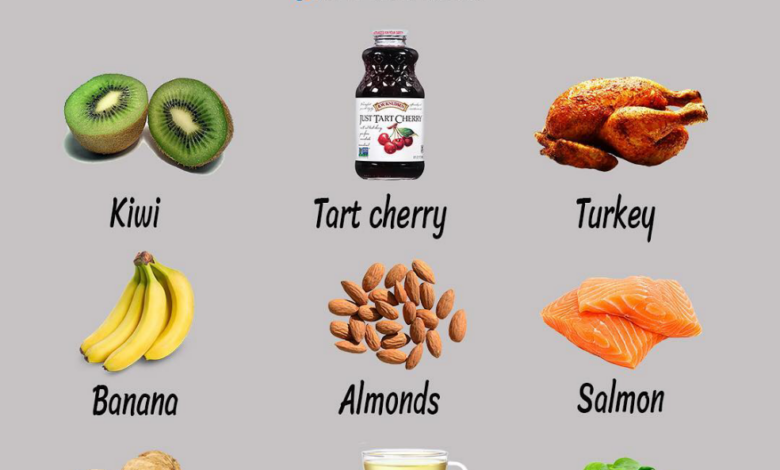
What To Eat And Not Eat For The Best Sleep Ever
What to eat and not eat for the best sleep ever? It’s a question we’ve all pondered, especially when we’re tossing and turning at night. Our diet can have a profound impact on our sleep quality, and making smart choices can help us drift off easier and wake up feeling refreshed.
From understanding the power of tryptophan-rich foods to avoiding late-night caffeine, this guide will equip you with the knowledge to optimize your sleep through nutrition.
This article delves into the fascinating world of sleep-enhancing and sleep-disrupting foods, exploring how our dietary choices can influence the quality and duration of our sleep. We’ll uncover the science behind specific foods and beverages, learn about the importance of meal timing, and discover how simple dietary adjustments can pave the way for a more restful night’s sleep.
Foods That Promote Sleep
A good night’s sleep is crucial for our overall health and well-being. While getting enough sleep is important, the foods we eat can also significantly impact our sleep quality. Certain foods contain nutrients that promote relaxation and improve sleep duration.
Foods Rich in Tryptophan
Tryptophan is an amino acid that the body converts into serotonin, a neurotransmitter that regulates mood and sleep. Consuming foods rich in tryptophan can help increase serotonin levels, promoting relaxation and improving sleep quality.
- Turkey:A well-known source of tryptophan, turkey is often associated with sleepiness due to its high tryptophan content.
- Chicken:Another excellent source of tryptophan, chicken is a versatile protein that can be incorporated into various meals.
- Eggs:A complete protein source, eggs contain a good amount of tryptophan and other essential nutrients that support sleep.
- Dairy Products:Milk, yogurt, and cheese are rich in tryptophan and casein, a slow-digesting protein that can promote sleep.
- Nuts and Seeds:Almonds, cashews, pumpkin seeds, and sunflower seeds are good sources of tryptophan and other sleep-promoting nutrients.
Foods Rich in Melatonin
Melatonin is a hormone that regulates our sleep-wake cycle. Consuming foods rich in melatonin can help regulate our natural sleep rhythm and promote sleepiness.
We all know that a good night’s sleep is essential for our health and well-being, and that means being mindful of what we eat before bed. While a light snack like a banana can be helpful, heavy meals or sugary treats can disrupt your sleep cycle.
Speaking of weight and sleep, you might be interested in reading how a vacation helped Charlotte lose half her body weight , which shows how a change in lifestyle can have a profound impact on both. Getting back to sleep, staying hydrated is key, so opt for a glass of water instead of a late-night coffee or alcohol.
- Tart Cherries:Tart cherries are a natural source of melatonin, and studies have shown that consuming them can improve sleep quality and duration.
- Walnuts:Walnuts contain melatonin and other sleep-promoting nutrients, making them a healthy snack option before bed.
- Oats:Oats are a good source of melatonin and complex carbohydrates, which can help promote relaxation and improve sleep quality.
- Bananas:Bananas contain melatonin and magnesium, both of which can help regulate sleep patterns.
- Tomatoes:Tomatoes are a good source of melatonin and other antioxidants that may support sleep.
Foods Rich in Magnesium
Magnesium is a mineral that plays a role in regulating muscle function and promoting relaxation. Consuming magnesium-rich foods can help reduce muscle tension and improve sleep quality.
- Almonds:Almonds are a good source of magnesium, along with other sleep-promoting nutrients.
- Dark Chocolate:Dark chocolate, especially the higher percentage varieties, contains magnesium and antioxidants that can improve sleep.
- Avocado:Avocados are rich in magnesium, potassium, and healthy fats, which can help promote relaxation and sleep.
- Spinach:Spinach is a good source of magnesium and other nutrients that support sleep.
- Edamame:Edamame is a good source of magnesium and protein, which can help promote relaxation and improve sleep quality.
Foods That Disrupt Sleep
While certain foods can help you drift off to sleep, others can have the opposite effect. Some foods and beverages contain substances that interfere with your body’s natural sleep-wake cycle, making it harder to fall asleep and stay asleep.
Caffeine
Caffeine is a stimulant that blocks adenosine, a neurotransmitter that promotes sleepiness. Consuming caffeine can lead to alertness, increased energy, and a faster heartbeat, making it difficult to relax and fall asleep. Caffeine can remain in your system for several hours, so it’s best to avoid it in the hours leading up to bedtime.
- Coffee:A common source of caffeine, coffee can keep you awake for hours after consumption.
- Tea:Black tea, green tea, and some herbal teas contain caffeine, which can interfere with sleep.
- Soda:Many sodas, especially those labeled as “energy drinks,” are high in caffeine.
- Chocolate:While it may not be as potent as coffee, chocolate contains caffeine and theobromine, another stimulant that can disrupt sleep.
Alcohol
While alcohol may initially make you feel drowsy, it actually disrupts sleep later in the night. Alcohol can interfere with REM sleep, the stage of sleep where dreaming occurs, and can lead to fragmented sleep and awakenings.
It’s recommended to avoid alcohol at least 4 hours before bedtime.
Nicotine
Nicotine is a stimulant that can interfere with sleep. It can increase alertness, heart rate, and blood pressure, making it difficult to relax and fall asleep. Nicotine can also lead to sleep apnea, a condition where breathing repeatedly stops and starts during sleep.
Timing of Meals and Sleep
The timing of our meals plays a crucial role in our sleep quality, as it influences our digestion, hormone levels, and overall body rhythm. Eating late at night can disrupt these processes, leading to poor sleep and other health issues.
Understanding the relationship between meal timing and sleep can help us optimize our sleep hygiene and improve our overall well-being.
The Impact of Late-Night Meals on Sleep and Digestion, What to eat and not eat for the best sleep ever
Consuming meals close to bedtime can interfere with sleep due to the digestive process. When we eat, our body directs energy towards digestion, increasing metabolic activity and core body temperature. This can make it harder to fall asleep and stay asleep throughout the night.
Additionally, late-night eating can lead to indigestion, heartburn, and bloating, further disrupting sleep.
The Importance of Consistent Sleep Schedule and Its Correlation with Meal Timing
A consistent sleep schedule is essential for regulating our body’s natural sleep-wake cycle, known as the circadian rhythm. This rhythm influences hormone production, including melatonin, which promotes sleep. Maintaining a regular sleep schedule, including consistent bedtime and wake-up times, helps synchronize our internal clock and optimize melatonin production.
A consistent sleep schedule also encourages regular meal timing, which further reinforces the body’s natural rhythms.
While avoiding late-night caffeine and sugary treats is a good start to better sleep, some people swear by specific foods like tart cherries or chamomile tea. But when it comes to supplementing for sleep, the experts debate should you supplement, experts debate should you supplement , or rely on natural methods.
Ultimately, finding what works best for your body is key, whether it’s a calming cup of herbal tea or a carefully crafted dinner plan.
Guidelines for Optimal Meal Timing for Achieving Restful Sleep
To ensure optimal sleep, it’s recommended to finish dinner at least 2-3 hours before bedtime. This allows sufficient time for digestion to complete and for our body to wind down before sleep.
- Avoid large meals close to bedtime:Large meals require more energy for digestion, increasing metabolic activity and potentially disrupting sleep.
- Limit sugary and processed foods:These foods can cause blood sugar spikes, followed by crashes, leading to sleep disturbances.
- Choose light and easily digestible meals:Opt for meals rich in protein and fiber, which are known to promote sleep and satiety.
- Stay hydrated throughout the day:Avoid excessive fluid intake before bedtime to minimize the need to wake up during the night.
Dietary Habits for Sleep
Beyond the specific foods you consume, your overall dietary habits play a crucial role in influencing sleep quality. Consistent eating patterns, proper hydration, and a balanced diet contribute significantly to creating an optimal sleep environment for your body.
Hydration and Sleep
Water is essential for various bodily functions, including sleep. Dehydration can lead to disrupted sleep, causing you to wake up frequently during the night. Adequate hydration throughout the day helps regulate your body temperature, maintain electrolyte balance, and prevent dehydration-induced sleep disturbances.
So you’re trying to get the best sleep ever, right? That means ditching the late-night pizza and opting for a calming chamomile tea instead. But what if you’re constantly hungry, even after a healthy meal? That’s where things get tricky.
You might want to check out this article on 4 reasons you’re hungry all the time , because it could be a sign of something else entirely. Once you’ve addressed those underlying issues, you can focus on sleep-promoting foods like almonds, cherries, and bananas for a good night’s rest.
- Drink water regularly throughout the day, aiming for at least 8 glasses. You can also consume hydrating beverages like herbal teas or fruit-infused water.
- Avoid excessive caffeine and alcohol consumption, as they can dehydrate you and disrupt your sleep.
- Listen to your body’s thirst cuesand drink water whenever you feel thirsty.
Regular Meals and Snacks
Maintaining stable blood sugar levels is vital for promoting restful sleep. Irregular eating patterns, including skipping meals or consuming large meals close to bedtime, can cause blood sugar fluctuations that disrupt sleep.
- Eat regular meals and snacksto keep your blood sugar levels steady throughout the day.
- Choose nutrient-rich snacksthat provide sustained energy, such as fruits, vegetables, nuts, or yogurt.
- Avoid sugary and processed foods, as they can cause blood sugar spikes and crashes, leading to sleep disturbances.
Benefits of a Balanced Diet
A balanced diet rich in fruits, vegetables, and whole grains provides essential nutrients that support sleep. These foods are packed with vitamins, minerals, and antioxidants that promote relaxation and improve sleep quality.
- Fruits and vegetablesare rich in melatonin, a hormone that regulates sleep-wake cycles.
- Whole grainsprovide complex carbohydrates that provide sustained energy and promote a feeling of fullness, reducing nighttime hunger pangs.
- Lean protein sources, such as fish, chicken, and beans, help regulate blood sugar levels and promote muscle repair, contributing to a restful night’s sleep.
Sleep-Inducing Beverages
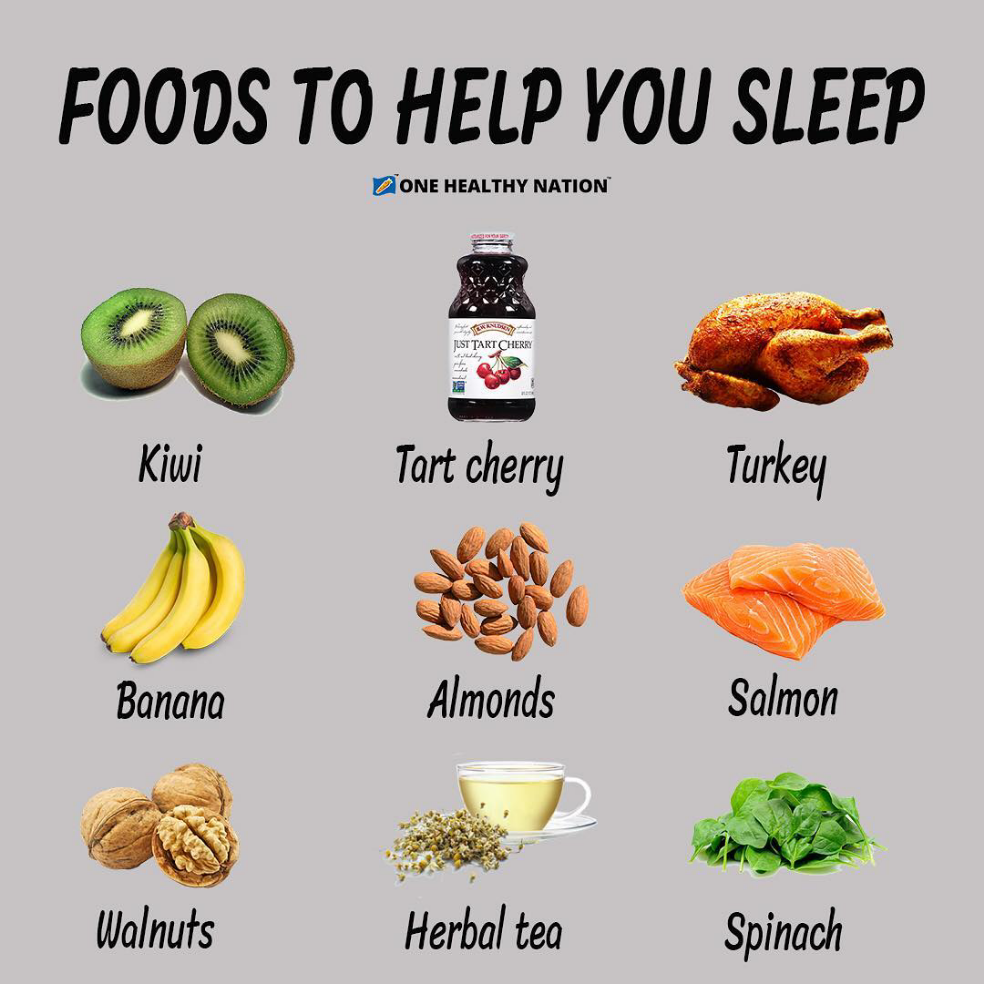
In addition to the foods we consume, certain beverages can also play a significant role in promoting restful sleep. These drinks can help calm the mind and body, preparing us for a peaceful night’s rest.
Herbal Teas
Herbal teas, known for their soothing properties, can be a comforting and effective way to unwind before bedtime. These teas often contain natural compounds that have calming effects on the nervous system, promoting relaxation and sleep.
- Chamomile Tea:Chamomile is renowned for its calming and sleep-inducing effects. It contains an antioxidant called apigenin, which binds to specific receptors in the brain, promoting relaxation and sleepiness. A study published in the Journal of Ethnopharmacology found that chamomile tea significantly improved sleep quality in participants with mild insomnia.
- Lavender Tea:Lavender is another herb commonly used for its calming and sleep-enhancing properties. It contains linalool, a compound known to reduce anxiety and promote relaxation. A study published in the journal Complementary Therapies in Medicine found that lavender aromatherapy was effective in improving sleep quality and reducing anxiety in individuals with insomnia.
- Valerian Root Tea:Valerian root is a popular herbal remedy for sleep disorders. It contains compounds that act as natural sedatives, promoting relaxation and sleep. A review of studies published in the journal Phytomedicine found that valerian root was effective in improving sleep quality and reducing insomnia symptoms.
- Passionflower Tea:Passionflower is a herb that has been used for centuries to promote relaxation and sleep. It contains compounds that have calming effects on the nervous system, reducing anxiety and promoting sleep. A study published in the Journal of Clinical Psychopharmacology found that passionflower extract was effective in improving sleep quality in individuals with generalized anxiety disorder.
Warm Milk
Warm milk is a traditional remedy for sleeplessness. It contains tryptophan, an amino acid that the body converts into serotonin and melatonin, both of which play a role in regulating sleep. The warmth of the milk can also have a calming effect, promoting relaxation and sleepiness.
While the effects of warm milk on sleep are not fully understood, anecdotal evidence suggests that it can be a helpful bedtime beverage for some individuals.
Hydration and Sleep
Staying hydrated is crucial for overall health and well-being, and it also plays a role in sleep quality. Dehydration can disrupt sleep patterns, leading to fatigue and difficulty falling asleep.
It is recommended to drink plenty of fluids throughout the day, but avoid consuming large amounts of liquids right before bedtime to minimize the need to wake up during the night for bathroom breaks.
Outcome Summary: What To Eat And Not Eat For The Best Sleep Ever
By understanding the impact of our dietary choices on sleep, we can make informed decisions to optimize our sleep quality and wake up feeling refreshed and energized. So, ditch the late-night snacks that disrupt your sleep, embrace foods that promote relaxation, and create a consistent sleep routine that supports your overall well-being.
Remember, sleep is a vital part of a healthy lifestyle, and by making smart choices with our diet, we can unlock the power of a good night’s rest.

